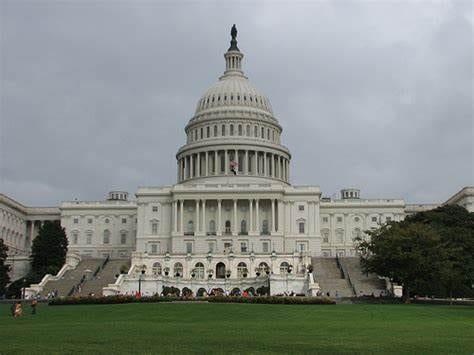

For years the United States (US) has been employing extraterritorial jurisdiction to impose oppressive sanctions on foreigners. Often, these sanctions violate due process rights because they are imposed without providing individuals with adequate notice, a fair hearing, or an opportunity to challenge the designation. The US has the authority to freeze assets, ban travel, and place other restrictions on financial transactions. This significantly impacts an individual’s human rights as the freedom to travel, freedom to work, and freedom to have privacy. Targeting individuals abroad for alleged activities that occurred outside of the US makes it evident that these restrictions are over-complying out of fear, a fear which is rooted in ethnophobia. Many Americans fear immigrants are taking their jobs, and sanctions like this only bolster this. Arbitrarily depriving someone of their property based on where they are from is an inherent violation of human rights. Unilateral coercive measures like the Global Magnitsky Act, Specially Designated Nationals and Blocked Person List, and Office of Foreign Assets Control sanctions have a disproportionately negative effect on international people.
The Global Magnitsky Human Rights Accountability Act authorizes the president to block or revoke the visas of certain “foreign persons” (both individuals and entities) or to impose property sanctions on them. People can be sanctioned (a) if they are responsible for or acted as an agent for someone responsible for “extrajudicial killings, torture, or other gross violations of internationally recognized human rights,” or (b) if they are government officials or senior associates of government officials complicit in “acts of significant corruption.” It was enacted as a deterrent for foreign political corruption but instead was a catalyst for arbitrary detention and arrests without due process. There is a lack of transparency and little to no evidence provided to justify designating individuals under the Act. UN Special Rapporteur Alena Douhan concerned about human rights violations states, “This is a clear violation of due process rights, including the presumption of innocence and fair trial.” The Act allows the US government to impose sanctions on individuals accused of human rights violations and corruption but does not provide them with a fair opportunity to challenge these allegations. Though it serves the purpose of preventing acts of terrorism and maintaining foreign accountability, the language is not concise enough to prevent arbitrary detentions or sanctions.
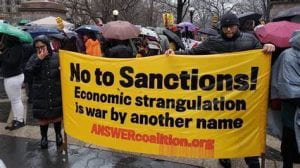
The SDN list is updated regularly with the names of individuals, entities, and organizations deemed to be involved in a range of criminal activities such as terrorism, narcotics, or arms. Therefore, US nationals are prohibited from engaging in any form of transaction with SDNs. Based on similar provisions under the Patriot Act, the government can block all of an individual’s or entity’s assets in the US. Similar to Magnitsky, there are concerns over transparency and due process violations. There have been inconsistencies in the way that individuals and entities are designated on the list, including cases where some individuals or entities are designated while others engaged in similar activities are not. Since the process behind the designation is not made public, it begs the question what is the real intention behind this decision and are there any underlying motives? Also, the list is public which subjects the individuals on the list to political abuse by targeting people that are seen as political opponents or rivals, rather than based on evidence of wrongdoing. “This is a clear violation of due process rights, including the presumption of innocence and fair trial, “ The Special Rapporteur observed.
OFAC is an office of the U.S. Treasury that administers and enforces economic and trade sanctions based on U.S. foreign policy and national security goals against targeted individuals and entities from foreign countries. OFAC sanctions can have unintended consequences and harm innocent parties, such as businesses or individuals that have no connection to the sanctioned entities or countries. The exterritorial reach the US has over foreign businesses is overt and unnecessary. Similar to the other legislation, there is a significant gap in knowledge between the government and the individuals affected. They do not know what they have done that has caused them to be targeted. The affected parties have no way to challenge these accusations if they are not aware of what they have done wrong, thus hindering the due process. The UN expert mentioned how human rights are infringed upon when US trade sanctions against specific countries penalize foreign companies for doing business.
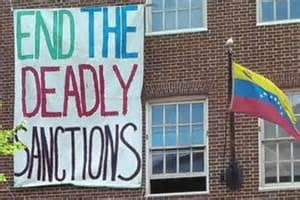
While these laws are in the interest of national security, we need to reevaluate if their ability to reach their intended goals or if have they just enforced discriminatory, biased legislation. There are concerns about their impact on innocent parties, lack of transparency and due process, extraterritorial reach, and potential for abuse. These are important factors to consider when evaluating the country’s presence in foreign entities. It is important to incorporate human rights protections in the sanctions the government passes because they affect international relations, global human rights, and the preservation of American ideals of democracy and equality.

Armed conflict often results in a wide range of human rights violations, including right to life, liberty, and security. Conflict can have a devastating impact on human rights, leaving individuals and communities vulnerable to a range of abuses and violations. Often times, during military conflicts, the elderly are overlooked when it comes to human rights abuses. Despite being among the most vulnerable members of society, the impacts of armed conflict on older people are often underreported, highlighting the need for greater attention and support for this marginalized group. Human Rights Watch released a report addressing the significant human rights violations older people endure during wartime. The report calls for the United Nations (UN) to end the abuses, provide protection, and facilitate humanitarian assistance for the elderly. The report documents a pattern of violations against the elderly in African and Middle Eastern countries experiencing war.
Older people are more likely to experience a range of physical, emotional, and economic challenges during times of conflict. Government and non-state armed forces have unlawfully attacked and killed older civilians, subjecting them to summary executions, arbitrary arrest and detention, torture and other ill-treatment, rape, abduction and kidnapping, and the destruction of their homes and other property. Older people are more likely to be injured or killed during armed conflict due to their reduced mobility, impaired senses, and other health issues. In the Central African Republic, for example, the armed forces executed Dieudonne, a blind 60-year-old man in July 2017. Many older people rely on family members and caregivers for support, but armed conflict can disrupt these networks, leaving them isolated and vulnerable. In Ethiopia, after Tigrayan forces recaptured most of the Tigray region in 2021, authorities arbitrarily arrested and detained older Tigrayans in Addis Abeba. Amhara forces in control of the Western Tigray zone detained elderly people in overcrowded detention facilities, subjecting them to beatings and other forms of ill-treatment. The stress and trauma of living in a conflict-affected environment can have significant impacts on older people’s mental health and well-being, and may exacerbate pre-existing mental health conditions. In South Sudan during government operations against rebel forces in February 2019, a soldier made a 50 year-old woman carry looted property, beat her with a gun, and raped her repeatedly. Sexual assault can have profound and long-lasting effects on an individual’s mental health and well-being.
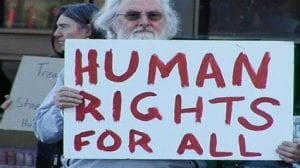
Another facet of the abuse is that displaced older people cannot access humanitarian aid. People experiencing must flee in order to access basic services such as food, shelter, and medical care. During hostilities, many older people have chosen not to flee their homes because they think they will not be harmed, or they want to protect the land they have had in their families for years. Also, limited mobility and disability lead to fewer elderly choosing to flee. In 2017, Myanmar security forces pushed older people who could not flee back into burning houses. Displaced older people have also faced difficulties in registering for and receiving humanitarian aid. In South Sudan in 2017, displaced older people who sought refuge were more likely to face difficulties in receiving aid than those who fled to Protection of Civilians sites within UN bases. Amnesty International has documented the failure of humanitarian actors to meet humanitarian standards and be inclusive of older people in their responses to conflict-driven displacements.

We should be concerned with the gross negligence of elderly’s human rights because every person deserves respect and dignity. Elderly individuals have a wealth of life experience and knowledge to share, and they deserve to be valued and respected for their contributions to society. Due to their age, older people are one of the most vulnerable groups, so it is up to us to do all we can to ensure their safety and protection. Protecting the human rights of elderly individuals is a matter of social justice. As members of society, they have the same rights and entitlements as anyone else, and it is our collective responsibility to ensure that these rights are upheld.

Over 60 years ago, the United Kingdom (UK) government secretly planned with the United States (US) government to forcibly remove an entire Indigenous people, the Chagossians, from their homes in the Chagos Archipelago. The Chagos Islands are a group of islands in the Indian Ocean. The UK has a long-standing dispute with Mauritius over the islands’ sovereignty. The UK separated the Chagos Islands from Mauritius in the 1960s, establishing a British Indian Ocean Territory (BIOT) on the islands. The original inhabitants of the islands, the Chagossians, were forcibly removed and relocated to other countries, including Mauritius and Seychelles. The eviction of the Chagossians has been a contentious issue, with many claiming that the UK’s actions were both illegal and unjust. The International Court of Justice (ICJ) ruled in 2019 that the UK’s separation of the Chagos Islands from Mauritius was illegal, and that the UK should cease administration of the islands.
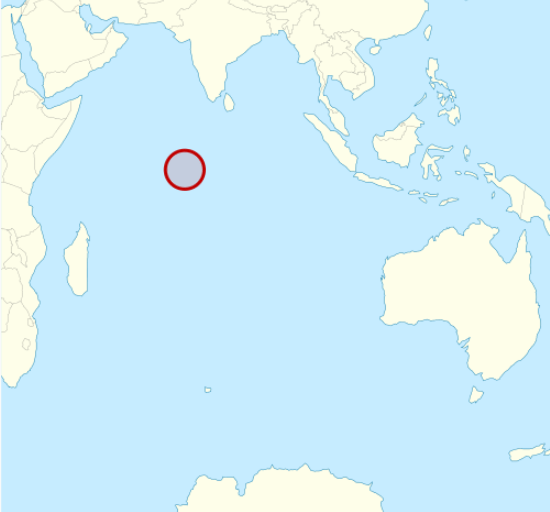
Diego Garcia, the largest of the inhabited Chagos islands, would be turned into a US military base, and the island’s inhabitants would be relocated. This is an ongoing colonial crime because according to article 9 of the Human Rights Act, “ No one shall be subjected to arbitrary arrest, detention or exile.” The UK government forcibly removed the indigenous people from their native, ancestral lands. This removal was carried out without their knowledge or consent, and they were given no say in the matter. This action infringed on their right to self-determination, a fundamental principle of international human rights law.
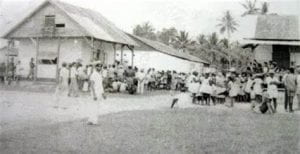
The reality was the indigenous people had been there for centuries developing their distinct culture, language, and customs. From 1965 to 1973, the UK and US forced the entire Chagossian population from all the inhabited Chagos islands to be displaced from their homeland. Both governments treated the people as if they had no human rights. The islanders were a fishing and coconut plantation community, and their forced removal from the islands cost them their livelihoods. When they were exiled, they were unable to take any of their possessions or belongings with them, and they were not compensated for their loss. This had a significant financial and social impact on their lives.
“My mother cried and said to us, ‘Now we will live a very different life’” quote from Louis Marcel Humbert, born in Chagos 1955. This was in response to leaving four brothers and a sister back on the island. Unable to bring their families with them, many families were broken and left in a similar situation. The strict restrictions imposed by the UK government on access to the islands made it impossible for families to even visit those they have left behind. The governments’ merciless persecution on the grounds of race and ethnicity have resulted in thousands of families being isolated from each other. This is a continuation of the colonization and exploitation of the inhabitators of Chagos. In 1814, the Chagos Islands were ceded to Great Britain as part of the Treaty of Paris, which ended the Napoleonic Wars. The islanders have been subject to forced removal for years.
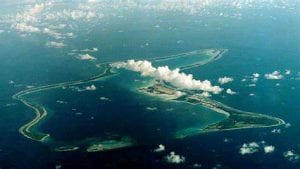
Despite the International Court of Justice ruling that the UK’s separation of the Chagos Islands from Mauritius was illegal and that the UK should end its administration of the islands as soon as possible, the UK government has retained control of the islands and denied Chagossians the right to return. Full reparations are in order and that starts by granting passage to return back to Chagos. The US and the UK need to provide restitution by immediately lifting the ban on Chagossians permanently returning to the Chagos Islands. This is a human rights violation from over 650 years ago that has yet to be corrected. By acknowledging the islanders were removed unlawfully, both governments can work towards rectifying the situation.
The right to equitable housing, employment, and standard of living are in jeopardy due to Nepal’s government policies towards the displaced community. In the capital district of Kathmandu, the mistreatment of vulnerable, minority populations ensues without providing any alternative measures. Street vendors line the capital with their small business trying to make a living, but new policies are allowing authorities to seize their property and rob them of their way of life. This campaign is accusing street vendors of blocking sidewalks and obstructing pedestrian pathways. People who cannot find regular employment resort to selling their wares on the street. Now, their livelihood is threatened. These are non-permanent, transition spaces for vulnerable individuals dealing with poverty. Nepal government is displacing people who already do not have a place to live, and they are not providing adequate housing. This is only exacerbating the significant homeless population in the country. Preying on this disadvantaged population is harmful and violates human rights.

Along the banks of the Bagmati River in Kathmandu, rumbles of protests seem to emerge. The city announced that they will be removing beggars in an effort to make Kathmandu a beggar-free city. The landless squatters held a rally on December 5th from Maitighar to New Baneshwor urging for the government to provide alternative housing. Demanding government aid and relief United National Squatters Front Nepal Chairperson Kumar Karki stated to the press, “Removing us from the current place without arranging an alternative is not tolerable. It is a violation of human rights.” The slum settlements in the Kathmandu valley are not a threat to the government.
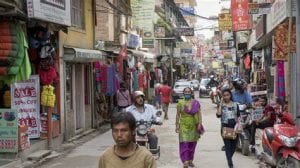
The government has bulldozed their living structures, so the only way to resolve the issue is through dialogue. Evictions are not the solution. According to the National Land Commission, a statutory body, the city government has failed to provide an alternative place to live. Under international human rights law, everyone has the right to the opportunity to work and to an adequate standard of living, including food, clothing, and shelter. The continued removal of residents is causing undue hardship on the citizens. This policy targets people who have no alternate source of income or no way of supporting themselves. Most of the time, it is young women and children which means now young women and children are being made homeless.

In order to prevent any more draconian governmental initiatives, you can get involved with Help Nepal. Donation, sponsorship, and volunteering are all great ways to support the Nepalese people faced with displacement. Posting on social media to raise awareness is another helpful measure. Speaking out against policies like this will result in less similar policies. Right to housing, work, and living are all basic human rights. Sprawling urban fringe is not only seen in Nepal, but in fact a lot of other parts of the world deal with these same issues. This is why it is important to discuss and bring attention to these topics.
Sri Lanka is in the midst of its worst economic crisis since gaining independence in 1948. Sri Lanka made a declaration of insolvency in early April 2022, after it could not service its foreign debt. Recently the United Nations renewed an humanitarian appeal, stating that 28 percent of the population faces food insecurity and that the poverty rate this year has doubled. The dramatic fuel shortages caused by a steep drop in agricultural output are accompanied by mass protests. Additionally, the country is also experiencing a rapid deterioration of the health system. In Sri Lanka, health challenges are interwoven with a deteriorating socioeconomic landscape, lack of essential medicines, and human rights violations. Student activists have been detained under the notorious Prevention of Terrorism Act (PTA) by President Ranil Wickremasinghe. He has even threatened to declare a state of emergency in the event of major protests. People in Sri Lanka have no recourse to hold politicians accountable for mismanagement or corruption.
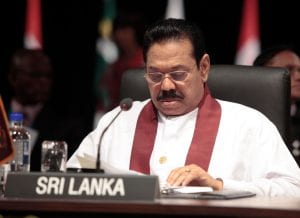
After years of accruing foreign debt, the current economic downfall has been looming in the shadows for a while. Mainly investing in large-scale infrastructure projects, the government projects provided no real economic benefits for ordinary Sri Lankans. Therefore, it resulted in a failed investment; one which Sri Lanka is still attempting to pay back. The government’s economic policies have only exacerbated the human right crisis. The economic downturn has had an unequal impact on the country with lower–class, marginalized communities feeling the effects in a detrimental way. Instead of addressing this issue, the government has decided to provide fuel and electricity for the middle–class and above. They are doing so in order to promote a false sense of hope by making it seem like all is well, when in fact over a third of the population is without food.
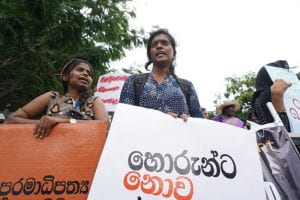
These realities have not been addressed by legal reforms. Employee rights to fair wages, decent working conditions, the right to organize, and secure social protection are often violated by employers, with no consequences. Legislation to resolve land disputes, housing issues, access to basic livelihoods, and ensure a sustainable environment is inadequate. Moreover, investments in education, health, and equitable development have been put on hold since the late 1970s. Sri Lanka’s lack of constitutional recognition of socio-economic rights leaves people without a legal framework to protect themselves from the many abuses they face every day. The economic crisis has revealed the benefits the system is designed to provide – those of capital and the political elite. Popular protests are challenging the existing economic order, authoritarian rule, and even constitutional shortcomings.
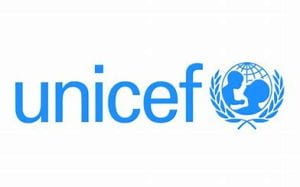
Here are some ways to take action and support the people of Sri Lanka. Write a letter or follow this sample letter demanding the release of the student activist that is being arbitrarily imprisoned due to anti-government protests. This Urgent Action expires on January 3, 2023, so please enact the change as soon as possible. You can also donate to UNICEF’s Appeal for Sri Lanka and help them meet their goal of providing food for children who are disproportionately affected by the rapidly unfolding economic crisis. The right to food, the right to protest, and the right to equality are universal human rights that everyone should have access to. By supporting these initiatives, you can take an active step in ensuring this as a reality rather than an illusion.
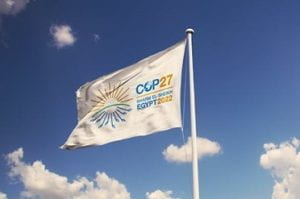
As the sun strikes the arid, blazing desert in Southern Egypt, the leaders of the world gathered to attend the most prominent, consequential global climate summit. During this event, leaders discussed commitments to finance climate action in developing nations by urgently reducing greenhouse gas emissions, building resilience, and adapting to the inevitable effects of climate change. An international conference synonymous with climate change, the 27th Conference of Parties (COP27) was hosted by the United Nations in Sharm el-Sheikh (Egypt) from November 6th to 18th. COP27 seeks to renew international solidarity in the face of an unprecedented energy crisis, a record of extreme weather occurrences, and an increase in concentrations of greenhouse gases. Ninety heads of state, including US President Biden, attended, alongside staunch environmentalist Greta Thunberg and other sustainable advocates. Everyone is affected by climate change, but some regions will experience the most adverse impacts of climate change. It is essential that these influential heads of state keep these areas in mind when formulating their environmental policies.

Hoping to avoid the pitfalls of last year’s COP, there was a lot at stake this year. COP26, held in Glasgow, made a few, modest steps forward, such as reducing emissions, declaring zero-emission vehicles to promote greener transportation, and acknowledging deforestation. However, there were some shortcomings. To keep the possibility of limiting global warming to 1.5 degrees Celsius, a firm commitment to zero emissions by 2050 was expected. This required a 45% reduction in emissions in 2030 compared to 2010. However, the signed agreements put us on track for an average temperature increase of about 2.4 degrees Celsius. Another major setback was that one of the objectives to phase out coal and stop financing new coal-fired power plants was revised to “phase down” because Australia, China, India, and the United States, some of the largest coal producers, were not present for the proposals. Despite some strides, adherence to these treaties has not resulted in the action required to alter the course of global climate change. Enacting impactful, effective change can only be achieved collaboratively.
“COP27 comes in the wake of a terrifying summer in which the Arctic burned, scorching heatwaves ravaged Europe, and floods submerged huge swathes of Pakistan and Australia,” noted Agnès Callamard, Amnesty International’s Secretary General. With this in mind, three policy areas have been proposed: mitigation, adaption, and loss and damage. Mitigation is concerned with lowering greenhouse gas emissions in order to stabilize the climate. A primary example of mitigation is the use of renewable energy sources instead of fossil fuels. The following step would be to adapt initiatives supporting climate resilience and reducing vulnerability, such as interventions to address food insecurity and biodiversity. Finally, loss and damages refer to the economic and non-economic damages caused by slow-onset events and extreme weather events caused by global warming, as well as the tools and institutions that identify and mitigate such risks. Climate policy recognizes and incorporates mitigation and adaptation. However, highlighting loss and dames in international treaties and negotiations has been proven to be difficult. Additionally, COP27 is tasked with dealing with the tragedy of the commons, where neighbors benefit from shared goods, such as an area of pasture or an irrigation pond, but their overexploitation ends up degrading the shared resource. These issues are all things are all on the table this year.
COP27 has also been at the center of controversy. This year’s environmental, global summit took place in Egypt, which is known for their human rights grievances. Last year Amnesty International ranked Egypt as the third worst country by number of executions. Additionally, Human Rights Watch states that thousands of people, including children, have been prosecuted in mass trials, “in unfair proceedings lacking the simplest resemblance to due process.” As well as subjecting people to torture and ill-treatment in detention, Egypt arbitrarily arrests and detains people on the basis of their sexual orientation or gender identity. In 2014, Egypt’s authorities intensified their restrictions on human rights and environmental groups. Since then, there has been a corresponding decrease in independent organizations and assemblies for environmental activism. Egypt’s response on the matter was disheartening and unsatisfactory.

A healthy, safe, and sustainable environment is necessary to fully exercise a wide range of human rights, including the rights to life, health, food, water, and sanitation. Millions of people are at risk of being displaced in the next few years due to rising sea levels and massive food shortages. Climate change is exacerbating existing inequalities, and the inability to limit greenhouse gas emissions is especially felt in communities already facing severe human rights violations. The impact that climate change will have on other, existing human rights will be catastrophic. The right to clean water and sanitation, the right to health, the right to food, the right to an adequate standard of living, and the right to life, all hang in balance in the wake of the current climate. Elected officials and industry leaders must hear public calls for strong, rights-respecting climate protection measures. States must protect the rights of people everywhere. We must ensure that the voices of young climate change activists around the world are heard.
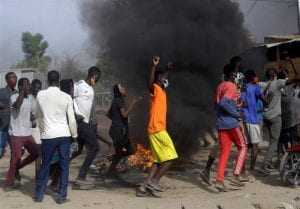
On October 21st, the thunderous crack of tear gas grenades echoed throughout the streets of Chad as palls of black smoke billowed into the horizon. The security forces in Chad’s two largest cities, Moundou and N’Djamena, indiscriminately opened fire onto an anti-government protest. About 50 people were killed and nearly 300 injured in violence that broke out in response to the delaying of the country’s transition towards civilian rule. Hundreds of protestors took to the streets to demand a quicker transition to democratic rule. They were met with internal law enforcement using tear gas and firing live ammunition to disperse the protest. Protesters threw stones; some unverified photos showed a few individuals with knives, but no evidence was found to indicate that protesters carried guns. It began with demonstrators advancing despite police releasing tear gas. However, once the police opened fire, demonstrators were forced to flee, with some helping to carry away the injured and dead. Saleh Kebzabo, the prime minister, announced the death toll at a news conference, explaining that the security forces acted in self-defense.
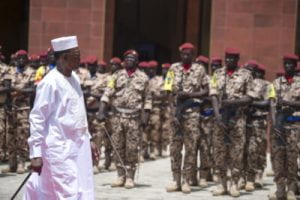
In April 2021, President Idriss Deby died after three decades of iron-fisted rule, sparking a period of political turmoil in the vast, military-run Central African nation of Chad. Mahamat Idriss Deby, his son, seized power shortly after the coup and promised that elections would take place after an 18–month transitional period. However, on October 1st, he postponed the democratic elections by 2 years. October 21st would have marked the end of the initially agreed 18-month transition period, which is why oppositional groups decided to hold the protest that day. The military junta serves to incite the underlying political challenges facing Chad. With a rise in extremist violence and deep social problems, Chad has recently seen a series of coups d’états.
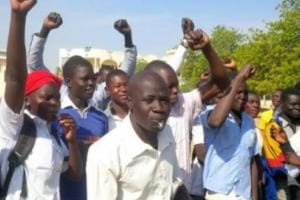
The Office of the High Commissioner for Human Rights (OHCHR) condemns the repression of demonstrations that led to deaths in Chad. Ms. Shamdasani, spokesperson for OHCHR stated that “Defense and security forces must refrain from the use of force against peaceful protesters and ensure that force is not used unless strictly necessary and, if so, in full compliance with the principles of legality, precaution, and proportionality.” Lewis Mudge, Central Africa director at Human Rights Watch, concurs, “People should be able to peacefully protest government policy without being shot at or killed.” The International Federation for Human Rights (FIDH) and its Chadian organizations, the Chadian League for Human Rights (LTDH) and the Chadian Association for the Promotion and Defense of Human Rights (ATPDH) have called for an immediate end to the violent repression of the demonstrations taking place in N’Djamena, Sarh, Doba, Koumra, Abeche and Moundou by the defense and security forces. No longer can the impunity enjoyed by the Chadian transitional regime endure.
What is going in Chad is a violation of human rights that threatens all of us. The preservation of human rights is imperative since these rights protect vulnerable groups as well as help fight against unjust cultural and religious practices that infringe on the rights of individual citizens. As a society that treasures the sanctity of human rights, we have a duty to be watch–dogs that safeguard these rights so that all rights, including ours, are protected. Article 19 of the United Nations Declaration of Human Rights guarantees everyone the right to free speech. Violence against unarmed protesters is not tolerable. Access to the democratic election process is the cornerstone of modern state governance. By deciding who governs, elections give citizens a voice in their government in the most fundamental way. Protecting voter rights preserves the integrity of the election, and therefore legitimizes government. A government without legitimacy is a failed state that cannot accomplish anything. Chad has a responsibility to its citizens to protect and respect their rights to peaceful assembly, freedom of expression, and freedom of opinion. Although conflict has been a regular feature since the country’s independence, these protests are the culmination of the current mixture of internal volatility and factionalism. Anyone who lives in the free world and values their liberty should be concerned for their own rights. It is important for Chad’s international partners to support civil society so that they can reduce violence risks and promote human rights. The deadly aftermath should serve as a harrowing reminder that our own human rights are in jeopardy if this situation is not remedied.
China’s hardline policies in the Xinjiang region have caused a rift within the United Nations Human Rights Council (UNHRC) over the detention of more than one million Muslim Uyghurs in reeducation camps. These camps are aimed at dismantling indigenous cultures and religions for those detained. A human rights commission within the United Nations -responsible for promoting the protection of human rights throughout the world and addressing violations of human rights voted on June 10th of 2022 over a Western-backed proposal. This proposal was an opportunity to hold a debate, essentially without any monitoring of the rights situation, and it was the least intrusive measures the council could take. Member states such as the United States, the United Kingdom, and Germany proposed holding the debate. However, 19 members of the council voted against the motion, 17 members of the council voted in support, and 11 members abstained from voting. Agnes Callamard, secretary-general of Amnesty International states, “Today’s vote protects the perpetrators of human rights violations rather than the victims – a dismaying result that puts the UN’s main human rights body in the farcical position of ignoring the findings of the UN’s own human rights office.”
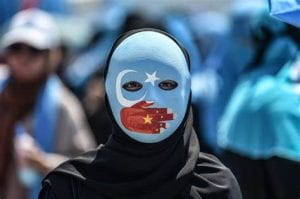
Days of diplomatic arm-twisting ensued in the UNHRC, and many national capitals in the weeks leading up to the vote as leading Western countries tried to get momentum behind a report from the former UN chief. The report, released on August 31st by the office of UN Human Rights, detailed serious human rights violations in Xinjiang that may amount to crimes against humanity. It documented a catalog of human rights violations including torture, sexual and gender-based violence, and mistreatment. According to the OHCHR report, the “extent of arbitrary and discriminatory detention of members of Uyghur and other predominantly Muslim groups … may constitute … crimes against humanity.” Despite their findings, the council still voted against addressing the conditions of the Uyghur Muslims in Xinjiang.
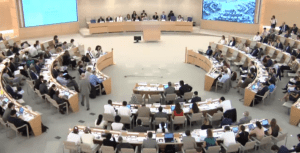
Under China’s “Strike Hard Campaign against Violent Terrorism, Chinese authorities have violated the rights of a million Uyghurs and other Turkic Muslims by arbitrary detention, harassment, and cultural persecution since 2017. Forced sterilization and forced separation of children are some of the harshest elements of the government’s oppression. Extremist, repressive laws are put in place to target these communities for nothing more than the personal choice of practicing Islam. The disproportionate and discriminatory application towards ethnic and religious minorities is concerning. Omer Kanat of the Uyghur Human Rights Project states, “The Chinese government’s singular goal has been to silence even a discussion of the issue — we cannot allow this to happen.”

Beijing, strategically employing its political and economic clout, sent a report from ambassadors in predominantly Muslim regions such as Africa, Middle East, Pakistan, and Saudi Arabia positively evaluating the human rights developments to the president of the. As China continues to influence the UNHRC, people will doubt if the council can remain impartial in its proceedings. By reaching this decision, the council has planted seeds of bias and crushed the Uyghurs’ hopes that the council will stand up to China to fight for justice. Many Muslim-majority states in support of the pro-Beijing statement have effectively turned their backs on the country’s oppression of the Uyghur Muslim population in Xinjiang. Before the vote, Chinese ambassador Chen Xu accused Western countries of seeking to turn a “blind eye” to their own issues on human rights and point a finger at others. No country has a perfect history of human rights; therefore, all countries are subject to scrutiny despite how much power they may wield.
The more pertinent question to be asked is, how vast is China’s economic pull that other countries factor into their decision-making? The United Nations Human Rights Council (UNHRC) consists of 47 countries and is regarded as the UN’s top human rights body. Annually, council members rotate among each other. However, a prominent country like China, with a permanent seat on the council, has never been the subject of a country-specific resolution from the council since it was established in 2006. It is a vicious cycle for other countries, including the largely Muslim-populated countries that voted against the debate, as their human rights record has been attacked frequently abroad; defending China becomes a way of defending themselves. Many Muslim-populated countries sided with Beijing due to their oppression by western imperialism. For example, various military interventions by the United States in these countries under the premise to widen their influence and democratic values has resulted in a distrust of the West. Nevertheless, this decision conveys a dreadful message: China is untouchable. This should not be the case. It is up to the citizens of these UN countries to hold these countries accountable for their actions. Human Rights violations continue to run rampant in the Xinjiang region, and despite the mounting evidence and international attention, China has failed to acknowledge or address these violations. Therefore, the duty falls to us to ensure the Uyghur Muslims are heard and their issues are addressed on a global stage. To help, contact these organizations:
International Commission of Jurists
Imagine living in a world where a woman showing her hair is considered “immoral” but killing a woman for showing her hair is not. Unfortunately for Mahsa Amini, that is the world we live in. On September 14th 2022, the 22-year-old was visiting the Iranian capital of Tehran with her family when she was arrested by Iran’s police. The reason for her arrest was wearing an “improper” hijab that did not adhere to the strict Islamic dress code laws. While in custody, she was beaten within an inch of her life and was comatose before being pronounced dead the following day. Iranian officials claim she died of a heart attack while in custody.
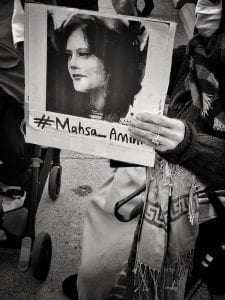
The Iranian government is implying that a dress code carries more significance than a young woman’s life. However, many Iranians disagree. In fact, women across the country have started publicly removing and burning their hijabs in protest. Burning head scarves is a powerful display that highlights the demand to end mandatory hijab laws. It is a direct objection to the controlling state’s policing of women’s bodies. Many people have taken to the streets to protest this blatant violation of human rights. Article 3 of the UN Declaration of Human Rights states, “Everyone has the right to life, liberty and security of person.” Iranian women’s liberty is in grave danger. Under Iran’s authoritarian regime, personal freedoms and the right to choose are in grave jeopardy. During the protests on September 21, Iran’s armed forces shot and killed more than 8 individuals. In the last 5 days, 15 protestors have died as a result of direct fire from government forces, with an additional 733 people injured and dozens imprisoned.
Iranian authorities have a long history of violent and inhumane enforcement of dress codes, specifically, compulsory veiling. This can be traced back to the Islamic dress code, a strict dress code that requires women to conceal their hair and neck with a head scarf and to cover their body. This law has been in effect in Iran since 1979, after Iran’s Islamic Revolution. The “Gasht-e-Ershad,” which translates as “guidance patrols”, patrol the streets of Iran enforcing these laws. They arrest individuals they deem in violation of this law, including women who do not adhere to the strict concealment of their body. In 2017, dozens of women removed their hijabs in defiance of the dress code. They waved their white hijabs standing on utility boxes. Since then, the morality police have taken severe measures to prevent women from disobeying the dress code. The arrests often involve verbal abuse and physical violence, targeting women and girls as young as 9 years old. Violent videos have emerged on social media depicting the “morality” agents forcefully detaining women, dragging them by their hair, administering beating with batons, and even spraying them with pepper spray.
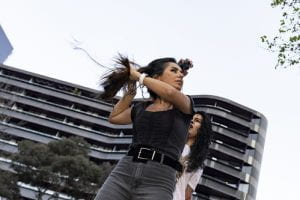
The presence of the morality police is a violation of freedom and dignity of the women in Iran. Western practitioners of Islam may misconceive these acts of protest as an attack on Islam. However, these individuals have the freedom to choose their religion; they are not forced to adhere to religiously influenced governmental action. It is important to make the distinction between burning symbols of the state and disrespecting religion. To many Iranian women, the mandatory hijab enforcement is not a religious symbol, but rather a symbol of their oppression. These protests are the result of religious trauma and not Islamophobia. This movement is not Anti-Islamic, but pro-liberty. Citizens across the nation are fighting against the unjust criminalization of women due to the strict, mandatory dress code. They are fighting against an authoritarian regime that weaponizes Islam as a tool of oppression.

The courage and solidarity these women are showing is quite moving. This may serve as a catalyst for the liberation of women around the world. As of now, Instagram is blocked in Iran. However, these activists’ valiant efforts will not be stifled. Now the baton passes to us. We must amplify their voices and raise awareness about the atrocities endured by these women by sharing hashtags and saying her name: Mahsa Amini. Follow these informative accounts and repost their posts:
@middleeastmatters
@masih.alineejad
@farnanak_amidi
@golfarahani
@negah_amirii
@duzenetekkal
Use this link to help people in Iran bypass the internet blockade Middle East Matters (mideastmatters.carrd.co). Donate to United for Iran and help fund the app Gershad that alerts woman the whereabouts of the morality police and protects women across Iran from unjust arrest. Everyone is entitled the most basic human right of choice. Women all around the world should be at liberty to wear what they want without fear of jeopardizing their lives.